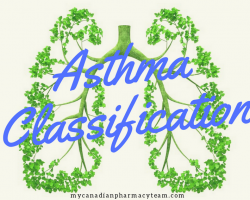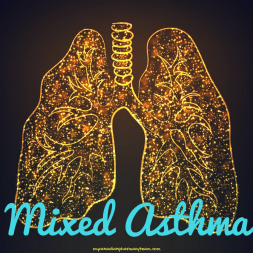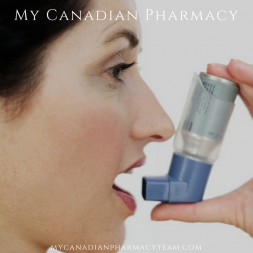European Classification of Asthma
Depending on causes of asthma attacks, there distinguish:
- atopic asthma – attacks are caused when allergen affects airways, coming from the external environment (pollen, mold, animal hair, tiny mites found in house dust);
- infection-dependent asthma – attacks are caused by factors such as infection, exercise, cold air, psycho-emotional stimuli;
- combined version of the disease – attacks can occur both when allergens affect respiratory tract and under the influence of the above factors.
In addition, asthma can have several specific clinical and pathogenetic variants: aspirin-induced asthma, exercise-induced asthma, occupational asthma, nocturnal asthma.
Chinese Classification of Asthma
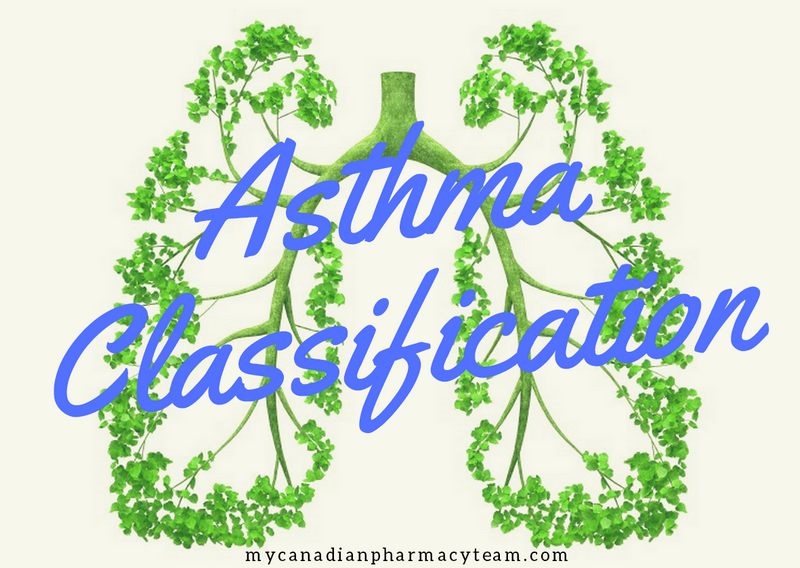 Depending on types of disorders in a human body there distinguish 5 asthma types, corresponding to different disturbing factors:
Depending on types of disorders in a human body there distinguish 5 asthma types, corresponding to different disturbing factors:
Wind: poor coordination of internal and external vital processes. It is accompanied by symptoms of paralysis and paresis, various twitching, headache, dizziness, biliary dyskinesia.
Heat: impaired immunity, high fever, thirst, accompanied by the tendency to arterial blood pressure increase, there may appear headaches, inflammatory diseases in nose, throat or ears, thyroid or heart diseases, chronic furunculosis or acne, regular nasal hemorrhages or ulcers on the tongue and oral mucosa, constipation.
Dryness: accompanied by clear inflammation. The lesion appears mainly on the skin and respiratory tract mucous membrane, maxillary and other sinuses, as well as intestines. Bronchial asthma of this type is accompanied by stable constipation or diarrhea, worsening after consuming fried and spicy foods, stimulants, coffee, tea, diuretics, chemical anti-allergic medications.
Cold: accompanied by a constant low temperature of extremities, weak resistance to cooling, viral diseases, chronic disorders of the genitourinary system, first – hypersexuality, and then – impotence.
Dampness: common at people who live in cold humid conditions for a long time. Asthma of the fifth type is accompanied by moist rashes, edema, colpitis at women, headaches before rain decreasing after taking alcohol, rheumatism, gastritis, cholecystopancreatitis.
Asthma main symptom is dyspnea and choking, speaking of airway obstruction. Often asthma attack is preceded by sneezing, coughing, rhinitis, urticaria fever.
Bronchial asthma is a chronic inflammatory disease of the respiratory tract, accompanied by their increased sensitivity to external and internal stimuli and manifested by recurring attacks of breathlessness.
The disease is classified according to:
- causes of aggravation – atopic bronchial asthma (related to bronchial tubes exposure to the specific allergen) and infection-dependent bronchial asthma (developing on the background of respiratory tract infection) are more common;
- severity degree – mild, moderate, severe.
Specially distinguished:
- hormone-dependent bronchial asthma, when a patient needs long, sometimes constant use of glucocorticoid hormones;
- aspirin-induced bronchial asthma – associated with intolerance to aspirin and other anti-inflammatory drugs (analgin, phenylbutazone, indomethacin, etc.) and is usually accompanied by nasal polyposis (polyps in nasal passages).
Asthma Classification (by Solopov V., 1994)
- atopic asthma (associated with allergic mechanisms of inflammatory mediators release).
- non-atopic asthma (associated with known and unknown non-allergic mechanisms of inflammatory mediators release).
- mixed asthma (for example, there is fairly established allergy: positive skin tests, combined with an aspirin intolerance and exercise-induced asthma).
Doctors distinguish several types of asthma:
- atopic (strange, special – in translation from Greek), this is an infectious-allergic type. It is more common at individuals with hypersensitivity to irritants of flora and fauna, as well as at children with genetic predisposition to diseases of this kind;
- infectious-allergic type of asthma appears in case of hypersensitivity to various fungi, bacteria and viruses. Most often this type of asthma starts after acute respiratory or other acute diseases accompanied by infection, that’s why you should promptly start and accomplish the process of asthma treatment;
- asthma, appearing as a result of physical exercises;
- neuro-psychological asthma;
- aspirin-induced asthma (occurs at a combination of individual intolerance of various anti-inflammatory drugs and exacerbation of nasal mucosa polyposis).
Allergies and Asthma: One of the Most Common Asthma Types
Allergies and asthma rarely exist without each other. Allergic rhinitis (also called hay fever) is an inflammation of nasal cavity lining, one of the most common chronic allergic diseases. People with allergic rhinitis observe hypersensitivity (allergy) to substances that provoke body’s immune cells to produce histamine to combat allergen. Histamine together with other substances causes aggravation of allergic symptoms. Typically, the most well-known and common allergens enter the body through the respiratory tract.
In allergic rhinitis, there can appear an ongoing runny nose, constant sneezing, inflammation of nasal passages, excess mucus discharge, watery eyes. Due to constant postnasal drip cough may appear. The cause of asthma symptoms exacerbation become allergic rhinitis. The doctor may prescribe medications to monitor allergy and perhaps they will also have a beneficial effect on cough and other asthma symptoms.
Exercise-Induced Asthma
Exercise-induced asthma is a type of asthma which symptoms exacerbate only during exercise or physical exertion. Even people, including Olympic champions, not suffering from asthma, during intense training may observe some symptoms of asthma.
During exercise-induced asthma exacerbation, maximal airway narrowing peak occurs in five to twenty minutes after exercises beginning, making it difficult to breathe. There may also be other symptoms characteristic of an asthma attack, such as wheezing and coughing. Perhaps before exercise, you will have to use asthma inhaler (bronchodilator) to prevent the occurrence of these unpleasant symptoms. Attending physician will tell you what to do and how.
Cough-Variant Asthma
At asthma, called cough-variant asthma, there is a severe cough – predominant symptom. This cough may have other reasons, such as postnasal drip, chronic rhinitis, sinusitis or gastroesophageal reflux disease (GERD or heartburn).
Asthma is a major cause of a cough, frequent nowadays. Cough-variant asthma is extremely poorly diagnosed and therefore difficult to treat. The most common causative agent of cough-variant asthma is a respiratory infection or physical exercise.
If you suffer from prolonged cough, visit your doctor. You may need to undergo specific tests that determine asthma presence, such as pulmonary function tests that show how well and properly the lungs are working. Before you get definitive asthma diagnosis, you should also carefully examine lungs, consult an appropriate specialist.
Occupational Asthma
Occupational asthma is an asthma type, pathogens of which are present at your workplace. Suffering from this type of asthma, you probably suffer from symptoms exacerbation from Monday till Friday, but on weekends you feel great.
Most people with this type of asthma suffer from a runny nose and nasal congestion, watery eyes or a cough instead of a usual characteristic of asthma wheezing.
Types of professions related to the development of occupational asthma include experts in animal breeding, farmers, hairdressers, nurses, artists, carpenters.
Nocturnal Asthma
Nocturnal asthma is a type of one of the most common asthma. If you have this type of asthma, most likely symptoms occur at night during sleep, which is predetermined by sleep-wake cycle (circadian rhythm). Nocturnal asthma symptoms include wheezing, coughing and dyspnea. They are very serious, especially during sleep.
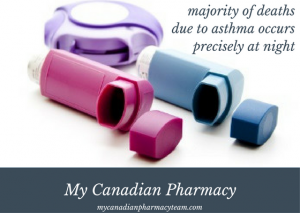 My Canadian Pharmacy studies have shown that the majority of deaths due to asthma occurs precisely at night. It is assumed that this may happen due to excessive exposure to allergens (asthma triggers), respiratory tract hypothermia, the horizontal position of the body or even hormonal changes that violate circadian rhythm. Sometimes cause of asthma during the night could be heartburn. Sinusitis and asthma can also create serious problems during sleep, especially at a postnasal drip, which causes such symptoms as coughing. Even sleeping itself changes the performance of lungs and respiratory tract.
My Canadian Pharmacy studies have shown that the majority of deaths due to asthma occurs precisely at night. It is assumed that this may happen due to excessive exposure to allergens (asthma triggers), respiratory tract hypothermia, the horizontal position of the body or even hormonal changes that violate circadian rhythm. Sometimes cause of asthma during the night could be heartburn. Sinusitis and asthma can also create serious problems during sleep, especially at a postnasal drip, which causes such symptoms as coughing. Even sleeping itself changes the performance of lungs and respiratory tract.
If you have asthma and you notice that symptoms of impending attack are beginning to appear in the evening, it’s time to visit a doctor and find out causes of asthma exacerbation, so do not put it away for later. Proper medical preparations and correct treatment technique are a key point in asthma symptoms control and sleep normalization.
Posted by Dr. Himanshu Singh

 English
English Deutsch
Deutsch Français
Français Italiano
Italiano Español
Español Svenska
Svenska Português
Português 日本人
日本人 Dansk
Dansk Norsk
Norsk Suomi
Suomi Czech
Czech